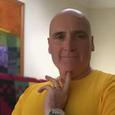To Heal or Not to Heal? That is the question. Well, it is a question anyway.
It is not a question you may have pondered too much, and if you have, given the choice of experiencing healing or to not experience healing. Then I think most of us, if not all of us, would tick the 'be healed' box.
We humans, and I suspect many mammals, are motivated by two underlying urges: To avoid pain and to experience pleasure. And many of our decisions and actions in our lives can be tracked down to these two primal urges.
What if, we had a third view point? A view point which encompassed all experience and refused to react automatically or unconsciously to it. How workable would that be? Would it be workable at all, or maybe just a little bit.
And how would the degree of pain or pleasure we are experiencing affect our decision? For instance, maybe I can resist reaching for a bottle of pain-killers when I get a mild headache. But toothache, no chance there, I'd be opening the bottle of pain-killers in a flash.
Working as a therapist, and reading some of the biographies of people who have survived extreme situations, it seems to me that different people have a remarkably different reactions to pain, and how they rate it on a scale of one to ten. There are a number of personal and cultural factors which can go some way to explaining these differences. For instance, during wartime people can and do develop a remarkable resilience to all kinds of abuse , whilst the spoiled and pampered rich-kid freaks out at the thought of a skin blemish.
So, let's explore this third point of view, whether we consider it to be achievable, achievable only some of the time during mild experiences of pleasure or pain or just plain imaginary. What would this third point of view be like? And, would we gain or lose anything by practicing it?
The 'I' Consciousness:
This third point of view I have been eluding to is possible, and it is one of the primary results of many core meditation
techniques. That is, becoming the observer, the unmoving witness of whatever is arising within your conscious awareness.
So what do we gain or lose by practicing this silent, accepting, meditation ? A sense of calm, an awareness of what our thought processes are up to, seeing again and again just who presses our emotional buttons and how they do it and a deeper sense of who I am and what I am not.
This is all very well in the safe and protected meditation space, but what about 'real life' and in particular what about in the context of this article; to heal or not to heal.
Whilst the answer to the question, "To Heal or Not to Heal" may seem self-evident, there are at least two scenarios where this choice is either not possible or it is not desirable.
The first of these scenarios is where there is limited or in effect no choice. The terminal illness, the deep emotional trauma which will never fully heal or the missing limb which cannot be replaced. What then? I would suggest that any experience you have of practicing this third point of view as I have called it, would be very valuable. It would at least reduce the wasted and destructive emotional energy of denial, looking for someone or something to blame, or the pointless desire for revenge.
The second of these scenarios, is where you refuse to be dictated to by your circumstances. And, in the case of illness or injury, you refuse to be defined by your symptoms. This refusal can be particularly liberating for someone with a chronic condition of many years in duration. You know, the one everyone asks you about when they meet you. This chronic condition is real, this is not about denying its' existence, it is more about asserting your control and re-positioning your awareness on the bigger you.
The Bigger You:And, there always is a bigger you.
In the silent meditation of deep contemplation, where we are encouraged to keep on letting go, keep on accepting whatever is arising in our minds and bodies. Until we let go of everything, including our desire for things to be different from how they are now, including letting go of 'letting go' itself. There, there is this you, untouched by any of this arising human experience; the good, the bad and everything in between.
In the liberating words of The Buddha Sakyamuni, the founder of Buddhism:
"There is an Unborn, Un-originated, Uncreated, Unformed. If there were not this Unborn, this Un-originated, this Uncreated, this Unformed, escape from the world of the born, the originated, the created, the formed, would not be possible. But since there is an Unborn, Un-originated, Uncreated, Unformed, therefore escape is possible from the world of the born, the originated, the created, the formed."
© David R. Durham.
I am a spiritual healer, spiritual counsellor and Cranio-Sacral therapist with a passion for spirituality within the rich diversity of our human experience.
Website: http://www.drdspirithealer.com
Blog: http://david6591.wordpress.com


